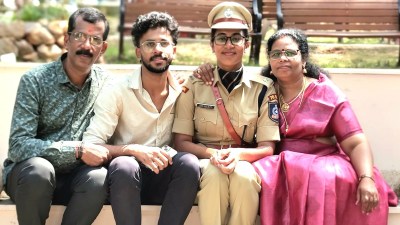Delay in trial due to Covid can’t be sole ground for grant of bail: HC
The court said that COVID-19 is a nationwide problem faced by the country and the same cannot be the sole ground for the grant of bail to the petitioner, in response to a bail plea which had been filed by the accused in a drugs case from Sirsa.
 The undertrials who tested positive earlier this month have now tested negative and are in quarantine ward of the district jail, the court was told, adding that none of their contacts tested positive.
The undertrials who tested positive earlier this month have now tested negative and are in quarantine ward of the district jail, the court was told, adding that none of their contacts tested positive.
The Punjab and Haryana High Court in an order has said that the delay in trial in a case on account of COVID-19 pandemic cannot constitute the sole ground for grant of bail.
“It is a nationwide problem which the country is facing today and therefore, the same cannot be the sole ground for the grant of bail to the petitioner,” Justice Jasgurpreet Singh Puri said in an order dated June 17 while dismissing the bail plea of the accused. The accused in a drugs case from Sirsa had filed a second petition for regular bail saying he is “insecure” in the jail due to the pandemic. The counsel representing him during the hearing on June 11 also highlighted that two cases of COVID-19 were reported from the jail.
Superintendent of Prison in Sirsa district submitted a status report before court, saying all the arrested persons are being tested for coronavirus before lodging them inside the jail and are kept in special isolation wards away from other inmates till the test reports are received. In case of negative, they are still kept in quarantine within jail for 14 days and are taken to hospital if found positive.
The undertrials who tested positive earlier this month have now tested negative and are in quarantine ward of the district jail, the court was told, adding that none of their contacts tested positive. The court was also informed of various precautionary measures being taken inside jails. Following the report of the jail authorities, the counsel representing the accused did not press the COVID-19 ground but prayed instead for bail on grounds of delay in trial.
Panel reiterates directions regarding arrests
The committee headed by Justice Rajiv Sharma, the executive chairman of Haryana State Legal Services Authority, has been informed by the state that 38 per cent of accused arrested between May 1 and June 6 are first-time offenders and are accused of offences punishable with imprisonment up to seven years. While Gurgaon and Nuh have low percentage of such arrests, Sirsa, Hisar, Ambala, Rohtak and Yamunanagar have high percentages of such arrests. A total of 1,503 accused or undertrials have been arrested between May 1 and June 6 for such offences in Haryana.
Reiterating that the committee on May 22 had directed the investigating officers to avoid arrest of the first-time offenders booked for offences punishable with imprisonment up to seven years unless it is of utmost necessity, the committee in the minutes of the meeting held on June 15 said, “the police department, Haryana is again directed to take necessary steps in this regard and circulate these directions to all the police Stations for necessary compliance”.
The committee has also ordered extension of parole, furlough or interim of all those who were required to surrender between June 21 and May 7 by 10 weeks. Those required to surrender between July 8 and July 21 have got freedom of eight more weeks. Similarly, those required to surrender between July 22 and August 7, August 8 to August 21 and August 22 to September 7 have got extension by six, five and four weeks, respectively.
The committee was constituted in March on orders of the Supreme Court to take decisions regarding decongesting the prisons to control the spread of coronavirus. DGP Prisons and state Home Secretary are its other members. The committee has also ordered that vulnerable groups inside jails be given healthy, nutritious and diet enriched with vitamin C to increase their immunity and has asked the state to consider providing such diet to all prisoners.
The female prisoners of District Jails in Panipat, Kaithal, Sonepat, Kurukshetra and Yamunanagar have been ordered to be shifted to Central Jail, Hisar-2 and female prisoners of Narnaul jail have been ordered to be shifted to Jhajjar jail to use the female wards of these jails as isolation wards. The COVID-19 dedicated hospitals have also been ordered by the committee to establish special prisoner wards on the pattern of civil hospitals.
The committee has also ordered that suitable places may be identified in and around the central or district jails by the Deputy Commissioners in consultation with police and Jail authorities, which can be used as temporary jails in case there is an outbreak inside the jails.







